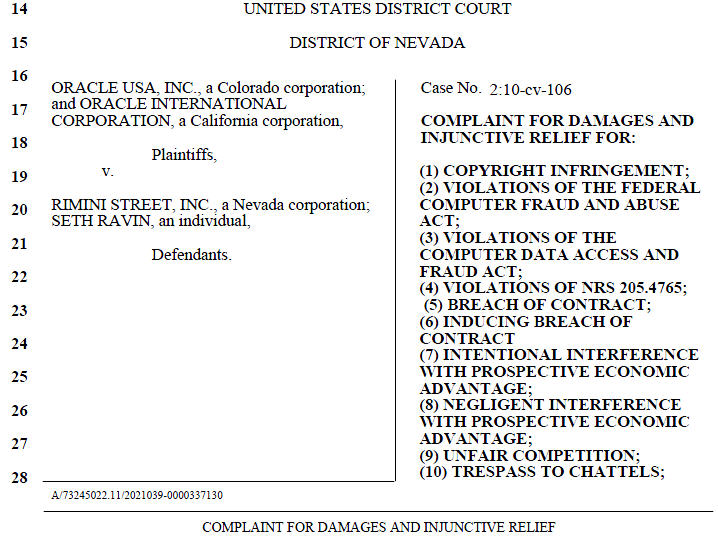Oracle sues Rimini Street, alleges 'massive theft'; Is third party support dead?

Oracle has filed a lawsuit against Rimini Street, a third party support provider, alleging "massive theft of Oracle’s software and related support materials through an illegal business model."
The lawsuit names Rimini Street as well as CEO Seth Ravin. In a statement, Ravin said:
I believe Oracle’s actions are an attempt to forestall competition and limit market choices for its software licensees. Rimini Street offers valuable support options at more than a 50 percent savings compared to Oracle. Rimini Street’s services are enjoyed by hundreds of clients around the world, including Global and Fortune 500 organizations, many government agencies, and small businesses trying to grow and hire new employees in these difficult economic times. Rimini Street has been a leader in fighting for customer choice and options, and we will continue to do so.
If this Oracle-Rimini showdown sounds vaguely familiar that's because it's similar to the battle between Oracle and TomorrowNow, which used to be a third party support unit owned by SAP. See: SAP to shut down TomorrowNow; Oracle gets its sacrifice
In fact the language of the complaint (PDF download) here's the PDF in full) sounds similar. To wit:
This case is about the massive theft of Oracle’s software and related support materials through an illegal business model by Defendant Rimini Street and its CEO and President, Defendant Seth Ravin. Rimini Street holds itself out as a support provider to companies that license certain of Oracle’s enterprise software applications, including its PeopleSoft, J.D. Edwards (“JDE”) and Siebel-branded software. Central to Rimini Street’s business model is the illegal downloading of Oracle’s Software and Support Materials in a scheme that is vast in scope, consisting of many thousands of Software and Support Materials. Rimini Street typically logs on to Oracle’s password protected Technical Support websites using a customer credential, then downloads Software and Support Materials in excess of the customer’s authorization under its license agreement. Sometimes Rimini Street will download hundreds or even thousands of Software and Support Materials at a time, relating to entire families of software (e.g., PeopleSoft, JDE, or Siebel) that the customer does not license and for which it has no use.
Oracle further alleges that Rimini Street automates massive downloading of support material with robots and crawlers. This downloading has disrupted Oracle's database. Oracle then tries to use Ravin's words mentioned in an article about the SAP-TomorrowNow lawsuit against him. Oracle continues:
Ravin has caused Rimini Street to acquire copies of its customers’ licensed Oracle enterprise applications software. In the course of its business, Rimini Street makes additional illegal copies of this software, and uses it in various illegal ways to provide its low-cost support. This illegal business model is not new for Ravin. He helped create this illegal scheme at his prior company, TomorrowNow (“SAP TN”), with his partner, Andrew Nelson. Under this business model, SAP TN gained repeated and unauthorized access to Oracle’s intellectual property. It made and used thousands of copies of Oracle’s copyrighted software applications and relied on illegal downloading from Oracle websites, using custom programmed “scraping” tools designed to “scrape” Oracle’s website for bug fixes, patches, updates and instruction manuals.
Ravin and Nelson sold SAP TN to the German software conglomerate SAP AG, and Ravin soon left to later found Rimini Street. SAP AG publicly admitted that SAP TN improperly copied Oracle Software and Support Materials, and in October 2008 shut down in SAP TN October 2008 having concluded that it could not provide support services without infringing on Oracle’s intellectual property rights.
The case goes on, but you get the idea. In the end, Oracle's suit may be enough to keep Rimini Street from landing new customers. For now, Rimini Street is doing well. Rimini has 300 customers and has doubled its employee base. The company also said 2009 revenue was up 270 percent from the year before. Oracle vs. Rimini could be quite the showdown. The stakes---the ability of enterprise customers to use third party support services---are certainly high.
